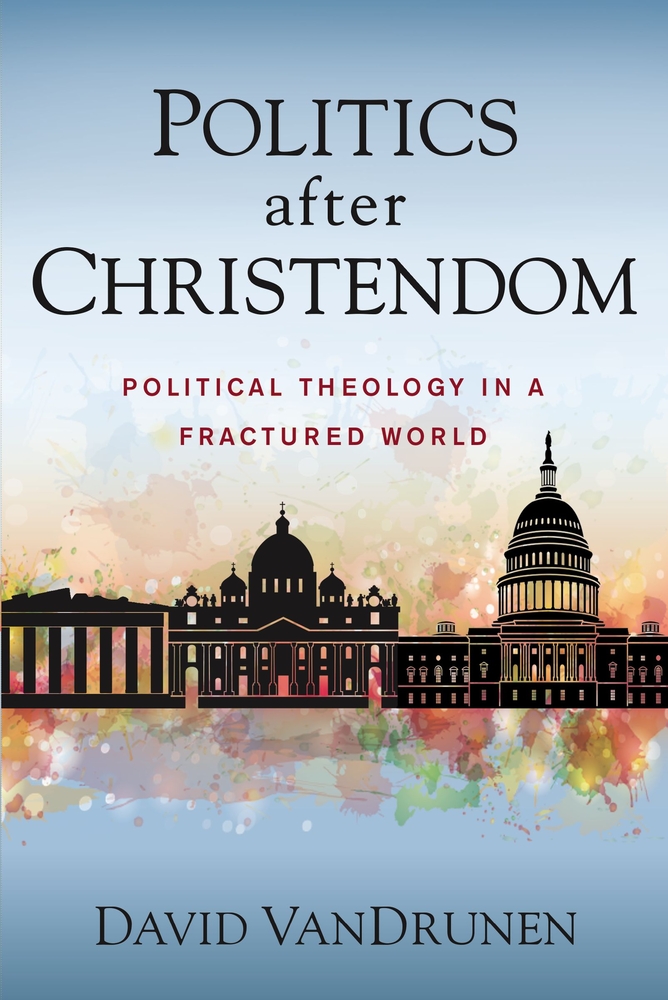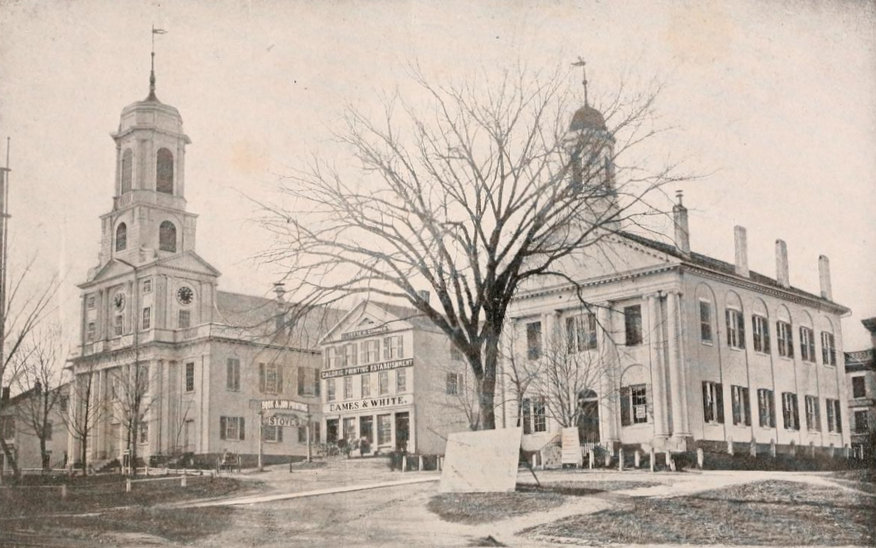Evans, GA. Christian authors have been proclaiming the death of Christendom since at least 1989, when Stanley Hauerwas and William H. Willimon made such an announcement in Resident Aliens. Thirty years later, David VanDrunen observes in Politics after Christendom: Political Theology in a Fractured World, “Christians have been trying to figure out how to navigate faithfully in such a world for quite a while now but seem to be as puzzled and divided about it as ever” (16).

VanDrunen thus seeks to “set out a political theology appropriate for the pluralistic world that post-Christendom societies have become” (16). In part 1, he “presents a biblical vision for political theology” (16, emphasis original), in which he argues that Christians should not “seek to redeem or transform their political communities so that these communities might somehow manifest and anticipate Christ’s coming kingdom” (18). In other words, Christians ought to bear in mind that affairs of state are “penultimate rather than ultimate” (29), and they should not (with credit to Eric Voegelin) immanentize the eschaton.
Instead, VanDrunen contends, “The political communities and civil governments of the world, including those in which Christians live today, are rooted in the Noahic covenant” (79), the covenant established between Noah and God after the flood (Gen 8:21–9:17). The purpose of this covenant is to “sustain the natural moral order and human society within it” rather than to save souls, which is the purview of the new covenant in Christ (150).
After VanDrunen lays out his political theology in part 1, part 2 explores how it might “shape the way Christians think about pressing issues of political and legal theory” (18). Here VanDrunen formulates a “modest” conception of the common good, derived from the Noahic covenant, that can “sustain a peaceful coexistence” among “people from a broad range of backgrounds” (187). This modest common good consists of “the good of forming familial institutions for purposes of procreation and filling the earth, the good of forming enterprise institutions [i.e., any association whose purpose is to promote “fruitful human commerce” (83)] to supply human needs, and the good of forming judicial institutions to promote justice in the face of violence” (187–188). In addition to elaborating on these basic components of the common good, VanDrunen also reflects on the nature of law and authority and the role of civil resistance, all in light of the Noahic covenant.
Overall, the book is a defense of what VanDrunen calls “conservative liberalism.” As he defines it, this political theology is liberal in that it aspires to “a social order marked by pluralism and tolerance,” and more specifically “the peaceful coexistence of individuals and institutions that hold different conceptions of ultimate truth and seek their own distinctive ends, achieved through voluntary cooperation and the protection of basic rights” (365).
Yet this liberalism is also conservative in that it is characterized by “respect for a long-acquired and hard-won wisdom” (369). Significantly, VanDrunen identifies this wisdom with the perception of the natural law, with “natural law” understood to “refer to the idea that God makes known the basic substance of his moral law through the created order itself.” This law is accessible to all people “apart from access to Scripture or other forms of special revelation. They know it through their natural capacities” (126).
On the relationship between natural law and wisdom, VanDrunen writes, “Coming to know the natural law is the same thing as maturing in wisdom. Wisdom is the subjective human faculty suited to perceive the objective moral order. Natural wisdom is perception of the natural law” (369). It is fair, then, to use the term natural law liberalism as a synonym for conservative liberalism, because the liberalism VanDrunen proposes is conservative precisely insofar as it is rooted in the perception of wisdom, i.e., the natural law.
As this condensed overview indicates, VanDrunen’s far-ranging discussion encompasses too many discrete ideas and topics for me to substantively engage them all. I will therefore focus on his understanding of conservative liberalism (henceforth “natural law liberalism”), as this term lies at the heart of his argument. Moreover, in evaluating natural law liberalism I will discuss the United States in particular, for according to VanDrunen America is a prime exemplar of this political theology, in that “the American Founding might…be described as conservatively liberal” (371).
VanDrunen holds that natural law liberalism has merit because it recognizes “the fact of diversity in moral-metaphysical-religious conviction” (360) among different people, while at the same time affirming the existence of “an objective moral order that underlies human justice” (369), which is the natural law. Furthermore, on VanDrunen’s account, what the natural law requires of political communities is modest and can be summarized by the three societal ends mentioned above: “the advancement of family life, enterprise, and justice against the violent” (188).
However, given the purported attainability of this low-bar common good, it is notable that contemporary American society has enshrined gross violations of at least two of these ends into its very legal structures. Instituting no-fault divorce and defining “marriage” as inclusive of homosexual unions strikes against the good of family formation—which, to be clear, VanDrunen qualifies as an endeavor to be undertaken within marriages that are “monogamous, heterosexual, and permanent” (221).
What is more, making abortion safe, legal, and none too rare is an utter dereliction of the duties of family formation and the promotion of justice against violence. As for the good of enterprise, one could argue that insofar as the United States has facilitated the growth of the financial sector—which involves itself with “creating abstract wealth” rather than “[generating] productive capital and genuine goods serving human needs” (John Milbank and Adrian Pabst, The Politics of Virtue, 93)—then it has also undercut the goal of “fruitful human commerce.”
In short, it is no exaggeration to say that America as a society is in open revolt against the natural law. While the examples given above are hardly exhaustive, on VanDrunen’s account they are egregiously antithetical to the common good on the most basic level.
Now the fact that the natural law is flagrantly defied on a societal scale does not discredit natural law liberalism. As VanDrunen points out, even when natural law violations are the law of the land, people can “exercise their powers of persuasion toward their children, their neighbors, or their coworkers in hope of shifting community opinion” (355). Put differently, it is always possible to use natural law reasoning to appeal to that common morality which is known to all, whether or not they recognize it: “Although arguments from natural law are never secular, impartial, or neutral in the sense intended by many liberal theorists, they are appropriate for political society insofar as God holds all people accountable through natural revelation (see Rom 1:19–20)” (368, emphasis original).
But while it is always possible in theory to use natural law arguments to persuade those who disagree with us, VanDrunen also observes that in practice such arguments rarely ever persuade people:
Although natural law theorists produce a considerable body of literature presenting sophisticated rational arguments about contemporary moral controversies, they persuade very few people to change their minds. The people who actually live in some significant conformity to the natural law are rarely up to date on the philosophical literature. They simply live well in their homes, neighborhoods, and workplaces. And the people who resist the claims of the natural law are rarely persuaded to reform their ways by a sharp intellectual argument. (148)
VanDrunen suggests that arguments are typically ineffective because people usually come to know the natural law by being “acculturated” in it throughout their lifetimes, rather than merely being exposed to it via arguments: “Maturing in wisdom is inescapably a communal process, and thus our ability to learn the natural law is enabled and constrained in profound ways by the social structures in which we participate” (148–149).
By implication, “Being born to foolish parents or into a corrupt political community severely impairs people’s prospects for attaining wisdom and thus for learning the natural law due to factors out of their control” (148). What follows from this, as VanDrunen himself spells out, is that natural law arguments are least likely to make sense precisely to those who are most in need of the truth such arguments seek to convey:
For natural law arguments to be sound, they must tap into the store of wisdom without which the natural law is incomprehensible. Yet that store of wisdom is attractive only to those who have been acculturated in its ways and have gained the perception of the world it provides. Those not duly acculturated, bereft of this perception, lack the wherewithal to appreciate the persuasiveness of such arguments. People who set themselves up against the norms of the natural law are not able to see the world in ways that make sense of them. They are foolish. And Proverbs emphasizes that it is very difficult to make headway arguing with foolish people, who ridicule and scoff (15:12; 21:24). It often may not be worth trying (23:9; 26:4). (149)
This strange dynamic—in which one advocates for the use of natural law arguments in public discourse even while acknowledging that such arguments are exceedingly unlikely to persuade people—is not unique to VanDrunen. Indeed, this is a common attitude among contemporary Christian natural law proponents, as I have discussed elsewhere.
The rationale for persisting in this questionable balancing act seems to be that we must keep making natural law arguments, despite their inefficacy, because we have no other legitimate means to keep ourselves from sliding into what J. Daryl Charles has called “majoritarian tyranny” (Natural Law and Religious Freedom, 253). This refers to a polity where, “In the absence of moral agreement these [moral] matters seem destined to be decided on purely political grounds: either by the decree of the state or by the power of majorities or the influence of interest groups” (Gerald McKenny, “Moral Disagreement and the Limits of Reason,” Intractable Disputes about the Natural Law, 196). Where this occurs, “It usually indicates a corruption of liberal democracy” (McKenny, 197).
So we are told that natural law arguments, however ineffective, must be made in order to avoid such an outcome. But as a matter of empirical observation, natural law arguments seem to have virtually no currency in contemporary American life—as we would expect, given VanDrunen’s observation that those born into a corrupt society are unlikely to appreciate such arguments. Is it not then fair to say that America is headed for (or has arrived at) majoritarian tyranny, i.e., illiberalism, and that natural law reasoning has been powerless to stop or even slow this development?
There is already significant evidence that America is becoming an illiberal society. In It’s Dangerous to Believe, Mary Eberstadt recounts many cases where traditionally religious Americans (particularly Christians) in recent years have been—not could be, but have been—“fired, fined, or otherwise punished for their beliefs” (11). Erick Erickson and Bill Blankschaen also report on such cases in You Will Be Made to Care. Both books describe the driving force behind this punitive treatment of Christians as a “substitute religion” (Eberstadt, 26). This raises the possibility that liberalism, “a political philosophy that was launched to…defend a pluralist tapestry of different cultures and beliefs…in practice…enforces uniformity and homogeneity” (Patrick Deneen, Why Liberalism Failed, 3), and of a sort that in our present context is antithetical to traditional Christianity.
But VanDrunen is concerned to “reflect on issues primarily at a general level, without getting lost in the special controversies of a particular time and place” (180). He therefore does not engage with the phenomena observed by figures like Eberstadt, Erickson, and Blankschaen, nor does he attempt to explain why such phenomena do not signal an impending (or already accomplished) collapse of liberalism. His reply to those who criticize liberalism for being an “ideology [that] pretends to neutrality” (Deneen, 5) is that the kind of liberalism he supports is not liberalism as an ideology, but “liberalism as a kind of polity or practical political arrangement.” This is “different from a philosophical or worldview liberalism because it does not presume to rest upon individualism, autonomous rationality, or a voluntaristic account of justice” (360–361).
Drawing a distinction between liberalism-as-ideology and liberalism-as-polity may be theoretically possible. As Jeffrey Bilbro notes, though, any state that has “a liberal polity and a more Christian ethos” is arguably “in a precarious and unsustainable arrangement.” American history seems to bear this concern out—to pose a question Patrick Deneen once asked of James K. A. Smith at a conference, as framed by Bilbro: “If liberalism is not inherently corrosive of faithful Christian commitments, then what went wrong? Why did liberalism become an ethos?”
In sum, Politics after Christendom is inadequate for our political moment because VanDrunen blithely takes for granted that liberalism grounded in natural law is sustainable, without engaging the mounting evidence that suggests otherwise. He declares that he “does not embrace the pessimistic outlook of some recent writers who portray the West as moving unstoppably into a dark age in which Christians will be mostly shut out of ordinary political life” (18). Yet he never offers an explanation for why this will not happen. If anything, his negative assessment of the efficacy of natural law arguments, coupled with our society’s ongoing revolt against the natural law and the corresponding slide into illiberalism, suggests that such an outcome is all too likely.
Those who wish to defend natural law liberalism must show why, against evidence to the contrary, natural law argumentation is in fact a proper and effective means of political engagement. They must show why Christian natural law theorists like Yves R. Simon and Russell Hittinger are wrong to say what Hittinger said in the foreword for Simon’s The Tradition of Natural Law—that when natural law argumentation is “expected to be an all-purpose antidote to the estrangements of modernity,” then it is “called upon to remediate more than reasonably can be expected” (xxiii).
In the absence of such argument, one can hardly blame people for concluding that the likes of Alasdair MacIntyre, Rod Dreher, Patrick Deneen, John Milbank and Adrian Pabst are on to something when they claim that “the working through of the logic of liberal thought ends up by drastically mutating or threatening to abolish liberalism itself” (Milbank and Pabst, 56). Indeed, the rising tide of illiberalism has not been lost on the signatories of Harper’s recent “Letter on Justice and Open Debate,” which states that “the forces of illiberalism are gaining strength throughout the world.”
Christian intellectuals are free to continue making appeals for societal cohesion grounded in natural law, but if most people are deaf to natural law reasoning then we face the specter of a most illiberal American future, notwithstanding the earnest pleas of liberalism’s defenders.







3 comments
Peter Seeley
A few notes:
First, I think you’re correct that natural law arguments are rarely persuasive when framed as such. However, I do think that part of the point of natural law is that it’s something most people do know at some level, even if they try to ignore. In the Abolition of Man, Lewis made this point well, when he asked (I paraphrase) whether there really is an entire society that praises those who flee from battle over the courageous. Most societies, even depraved ones, recognize certain basic moral concepts, and those ought to be appealed to. Will it work? I don’t know. But the problem lies in finding the alternatives. Some postliberals of a more F.P.R persuasion might try to make intentional communities that are explicitly Christian, and therefore don’t have to deal with the question of what unites the believer and non-believer in society. The problem with this, of course, is that some sort of settlement with wider society must be made so that these communities could be left alone. I frankly doubt the possibility of such an agreement.
Second is, I’m afraid a bit of pet-peeve of mine. I think that Deneen et alia tend to misread the early liberals pretty badly. One recurring chorus is “liberalism can’t sustain itself”, as if this were a slam-dunk argument against it. The problem is, just about every traditional liberal of any depth not only addresses this problem, but wholeheartedly agrees that liberalism can’t sustain itself. Montesquieu, the founders, and Tocqueville were always very clear that a free government can only exist if the culture sustains it. A despotism can sustain itself through fear, but a free government is only possible with strong societal norms and a devotion to the public good from it.
Rob G
Re: your second point. It’s true that “a free government can only exist if the culture sustains it,” but if I understand Deneen et al. correctly, what they are saying is that liberalism is itself ultimately subversive of that very sustaining culture, and has no means within itself to create something to put in its place.
American liberalism developed within a certain political and moral consensus, but that consensus is now gone, and liberalism by itself can only give us clashing subjectivisms. One or another of these may become a consensus, but it will be one achieved by compulsion.
Rob G
“the working through of the logic of liberal thought ends up by drastically mutating or threatening to abolish liberalism itself”
Dostoevsky was onto this when in Demons he has Shigalov say, “I am perplexed by my own data and my conclusion is a direct contradiction of the original idea with which I start. Starting from unlimited freedom, I arrive at unlimited despotism.”
One of Dostoevsky’s major points in all his fiction is that God has in fact made made man in a certain sense autonomous, but unless this autonomy is exercised God-ward, so to speak, it results in sin and evil. I’ve been reading Dostoevsky for years, and have long felt that the “answer” to liberalism is contained in nutshell form in Notes From Underground, and fleshed out more expansively in the later novels, but only (very) recently have I started wondering whether this answer has something to do with the difference in understanding of human freedom between Eastern Christianity and the Augustinian West. With this in mind I recently got a copy of Berdyaev’s Dostoevski: An Interpretation, which appears to examine his concept of freedom in some depth. I’m hoping that it’s a good place to start on the question.
Comments are closed.